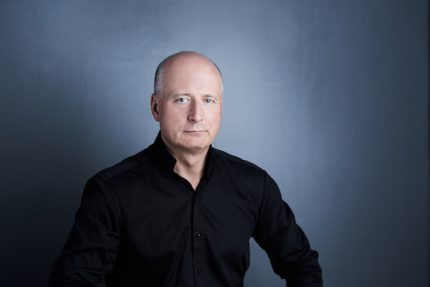Järvi helms vivid Berlioz with a strong CSO debut for pianist Grosvenor

Coming off of two weeks of powerful concerts under music director Riccardo Muti, the pre-concert atmosphere Friday night at Orchestra Hall felt palpably less electric. The audience was thin, many principal players were off, and numerous sections onstage were filled out with subs.
Nonetheless, visiting conductor Paavo Järvi, music director of the Tonhalle-Orchester Zürich, led an exhilarating program of Berlioz and Chopin that was anything but subdued, including an exciting debut from British pianist Benjamin Grosvenor.
The evening began with a spirited account of Berlioz’s Roman Carnival Overture. Järvi drew sparkling playing from the CSO musicians throughout the score, which the composer cobbled together out of material from his unsuccessful opera Benvenuto Cellini. Scott Hostetler’s rendition of Cellini’s aria on English horn was subtle and affecting.
Benjamin Grosvenor was initially slated to take his first turn in front of the orchestra in April 2019, but those performances were nixed by that year’s musicians’ strike. While he had previously appeared in recital on the Symphony Center Presents Piano Series, Friday night was his belated debut on CSO subscription concerts.
The 29-year-old was a largely compelling solo protagonist in Chopin’s Piano Concerto No. 2, Op. 21. He captured the brooding agitation of the opening Maestoso, where he was in sync with the rhapsodically shifting moods of Chopin’s writing. The exquisite central Larghetto had the intimate feel of one of the composer’s Nocturnes, Grosvenor sustaining its limpid melodies to great effect, though one wanted greater urgency and contrast in the chilling solo passages over sustained string tremolos.
The closing Allegro vivace, a mazurka, is in fact extremely witty music, though one would not have known it in Grosvernor’s overly literal account. Despite the lack of esprit here, this was a convincing concerto appearance and audiences can look forward to future outings from the young British star.
A vivid account of Berlioz’s Symphonie Fantastique was the evening’s second half. Järvi created a wistful haze in the slow introduction of “Dreams—Passions,” convincingly portraying the vague des passions that afflicts the work’s imagined protagonist. The madcap Allegro agitato had the appropriate feel of controlled chaos, the peaceful closing bars felt like a glowing benediction. A harp mishap got the ensuing “A Ball” off to a shaky start, but Järvi quickly established order to lead an elegant, swirling account.
Symphonie Fantastique is a work about madness, love- and drug-induced, and Järvi never lost touch with this aspect of the score. For all the serenity of the central “Scene in the Country,” its outbursts had a genuinely unhinged quality that made clear all was not at ease even in the movement’s bucolic wandering.
The ensuing “March to the Scaffold” had all the clarion menace one could hope for, and Järvi highlighted Berlioz’s countless ingenious effects in the closing “Dream of a Witches’ Sabbath.” The performance’s freshness left one feeling something of the shock audiences must have felt when they first encountered Berlioz’s work almost 200 years ago.
The closing moments of the Berlioz were scary and not just for the horrors Berlioz musically conjures. As the orchestral cacophony of the symphony’s final few minutes grew, longtime CSO harpist Lynne Turner appeared to faint and collapsed out of her chair onto the stage floor. Järvi drove the performance to its conclusion while clearly keeping an eye on the unfolding situation. Another musician summoned a stage technician, who helped Turner—appointed by Fritz Reiner in 1962—back to her chair and provided her with water and a damp cloth.
Järvi also checked on Turner, who was conscious and seated, as he exited the stage during the applause. He returned for a curtain call and, skipping extended bows, thanked the audience and gently encouraged everyone to leave quickly and quietly. As concertgoers filed out, the house doctor, house manager and others attended to Turner on stage. Turner left the hall by ambulance but “was feeling much better even by that time and is doing fine now,” a CSO spokesperson said in an email on Saturday.
The program repeats 8 p.m. Saturday and 7:30 p.m. Tuesday. cso.org
Posted in Performances




